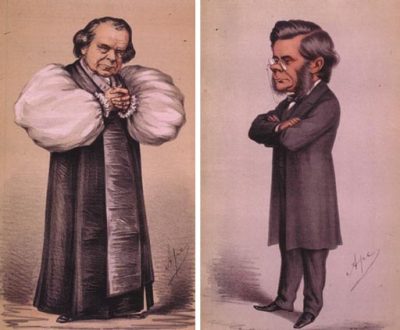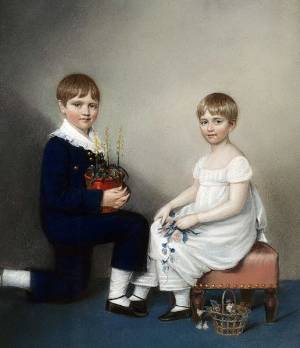Family
 Family was very important to Charles Darwin. Raised by his sisters after his mother died when he was 8 years old, he came to rely on their council. His father was very proper and was concerned that Charles needed to show more interest his future. Ultimately, though, he was a caring father who Charles admired with fondness. In his wife, Emma, Charles found true love, respect and devotion. She was his helpmate through his chronic illnesses and his playmate in social affairs and especially with their children. Their parenting style was rather liberal for their time. Charles’ greatest anxiety was for the effect of his work on Emma, as she was very concerned about his increasing distance from her religious beliefs. The death of their 10-year-old daughter Anne was a soul-crushing tragedy for Charles and Emma, but they supported one another through it and remained strongly committed to their other children throughout their lives. This presentation will share in their family’s stories to sketch a picture of life with the Darwins.
Family was very important to Charles Darwin. Raised by his sisters after his mother died when he was 8 years old, he came to rely on their council. His father was very proper and was concerned that Charles needed to show more interest his future. Ultimately, though, he was a caring father who Charles admired with fondness. In his wife, Emma, Charles found true love, respect and devotion. She was his helpmate through his chronic illnesses and his playmate in social affairs and especially with their children. Their parenting style was rather liberal for their time. Charles’ greatest anxiety was for the effect of his work on Emma, as she was very concerned about his increasing distance from her religious beliefs. The death of their 10-year-old daughter Anne was a soul-crushing tragedy for Charles and Emma, but they supported one another through it and remained strongly committed to their other children throughout their lives. This presentation will share in their family’s stories to sketch a picture of life with the Darwins.
Religion and Science
 Religious faith was frequently on Darwin’s mind. Both he and his wife Emma were raised in free-thinking Unitarian families. Charles studied for a life as a clergyman, but his allegiance to the 39 principles of theAnglican church was never strong. He had difficulty accepting the idea of eternal punishment for sins and his developing ideas about natural selection increasingly challenged his faith. To the end of his life he was tormented by the distance between his lack of faith and Emma’s fear that they would not be reunited after death. His discoveries about evolution cause a ferment in the established church at the time, but not long after his death Anglicans reconciled their beliefs with his theories. This presentation will discuss Darwin’s personal struggles with religious faith and the religious context in which his work developed.
Religious faith was frequently on Darwin’s mind. Both he and his wife Emma were raised in free-thinking Unitarian families. Charles studied for a life as a clergyman, but his allegiance to the 39 principles of theAnglican church was never strong. He had difficulty accepting the idea of eternal punishment for sins and his developing ideas about natural selection increasingly challenged his faith. To the end of his life he was tormented by the distance between his lack of faith and Emma’s fear that they would not be reunited after death. His discoveries about evolution cause a ferment in the established church at the time, but not long after his death Anglicans reconciled their beliefs with his theories. This presentation will discuss Darwin’s personal struggles with religious faith and the religious context in which his work developed.
Darwin’s Youth
Like many geniuses, Charles Darwin did not show much promise as a child and young adult. After his early years of hom e education, he boarded at a local school where the traditional curriculum was unsuited to the way his brain worked. Memorization of classic works in the classical languages left him uninspired and bored. He was more taken with collecting and being his brother’s laboratory servant in their home chemistry laboratory. At 16 he attempted medical school where his brother was finishing his studies, but the surgical demonstrations proved too much for him. At the insistence of his father, he switched schools to pursue a course of study to become a country pastor. Upon completion, he lucked on receiving an invitation to sail the world as a naturalist, and his life’s course was set for him at last. We will explore his journey growing up in a world of relative luxury, but of stultifying formal education. We’ll recount his wayward ways at University as he picked up scientific skills outside the classroom that served him well in his life’s work.
e education, he boarded at a local school where the traditional curriculum was unsuited to the way his brain worked. Memorization of classic works in the classical languages left him uninspired and bored. He was more taken with collecting and being his brother’s laboratory servant in their home chemistry laboratory. At 16 he attempted medical school where his brother was finishing his studies, but the surgical demonstrations proved too much for him. At the insistence of his father, he switched schools to pursue a course of study to become a country pastor. Upon completion, he lucked on receiving an invitation to sail the world as a naturalist, and his life’s course was set for him at last. We will explore his journey growing up in a world of relative luxury, but of stultifying formal education. We’ll recount his wayward ways at University as he picked up scientific skills outside the classroom that served him well in his life’s work.